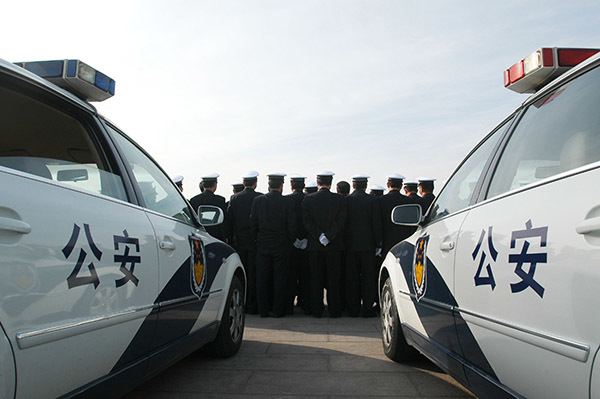Illustration: CCP Police Vehicle (China Photos/Getty Images)
People News – The Chinese National Radio and Television Administration (NRTA) recently released new regulations, implementing a "classification and tiered review" system for micro-dramas. It requires online platforms to refrain from broadcasting, promoting, or pushing works that are not marked with a license or filing number. While aimed at strengthening content management, the move has sparked industry debates on balancing creative freedom with market regulation. As several short-video platforms have swiftly removed non-compliant content, the era of unchecked growth in China’s micro-drama market may be coming to an end. Experts suggest that these new rules are not just about cultural and market considerations but are also crucial for the Chinese Communist Party (CCP) to maintain political safety and tighten control over public opinion.
Under the "classification and tiered review" system, Chinese domestic micro-dramas are categorized into three levels. Key micro-dramas and regular micro-dramas are required to submit project plans and completed works for approval by broadcasting authorities. Dramas involving special themes such as politics, military, diplomacy, national security, united front, ethnic and religious issues, or judiciary matters—and with a total investment exceeding 1 million yuan (approximately USD 136,000)—will be managed by the NRTA. Regular micro-dramas (with investments of 300,000 to 1 million yuan) and other smaller productions will be managed by online streaming platforms.
According to Voice of America, Chinese short-video platforms immediately began implementing governance actions after the new rules were announced. On February 10, platforms such as Douyin, Kuaishou, and WeChat released announcements about managing non-compliant micro-dramas, removing works with inappropriate values or vulgar "borderline" content. Kuaishou claimed to have rectified over 1,000 non-compliant titles.
Micro-Dramas Face Awkward Position Due to Limited Propaganda Function
Shangguan Luan, a writer originally from Chengdu and now residing in Taiwan, stated that Chinese film and television content has long been subject to censorship, and micro-dramas are no exception. General themes must be registered, while major themes such as those related to Hong Kong, Macau, Taiwan, the Republic of China, or judiciary issues are centrally managed. The current rules only increase censorship.
Shangguan Luan told Voice of America, "These new regulations are like prohibiting eunuchs from visiting brothels—completely unnecessary. It’s just about tightening control. In the past, they relied more on blacklists when things got out of control, but now it’s more about white lists, specifying which topics can be covered and using market control to direct funding flows."
She believes that production companies' self-censorship will always fall short of the official "red lines," but the authorities will strictly control the flow of funds in the industry to prevent hot money from being directed to content the government deems "useless" or "detrimental."
From a film and television perspective, Shangguan pointed out that micro-dramas are low-cost and have limited commercial potential, which led to relatively lenient regulations in the past. The authorities also hoped to use micro-dramas to promote local culture and tourism. However, since micro-dramas fail to meet government goals for promoting "positive energy," regulatory scrutiny has intensified.
"Micro-dramas are fundamentally incapable of fulfilling the propaganda functions that the authorities want, such as preaching or conveying the official narrative. Without positive propaganda outcomes, the authorities prefer to suppress them as useless," she explained.
The CCP’s official media outlet People’s Daily Online reported on January 13 that China’s micro-drama market has been "rapidly expanding," but the content has reinforced "binary oppositions," leading to value deviations. It called on micro-drama industry practitioners to prioritize "content as king."
Meanwhile, in January, the NRTA launched a "Micro-Drama+" initiative, promoting activities such as "travel with micro-dramas," "learn classics through micro-dramas," and "explore intangible cultural heritage through micro-dramas." The government is actively introducing policies to incorporate micro-dramas into the broader cultural industry development framework.
Political Safety Considerations Behind the Suppression of Micro-Dramas
Liu Shuting, a policy analyst at the Institute for National Defense and Strategy at the National Defense University in Taipei, pointed out that while the Chinese Communist Party (CCP) is promoting the development of the micro-drama industry, it is also concerned about the potential risks to its rule posed by the internet’s influence. For example, micro-drama content could trigger sensitive topics or become difficult to control if commercial profits expand too much, leading to risks to political stability. Themes related to united front work, ethnic groups, and diplomacy must be controlled under the unified narrative of the CCP’s central leadership.
"When the CCP increasingly emphasizes national security and identifies these themes as risky, it reflects its insecurity about its own governance," Liu Shuting told Voice of America. "It’s not just about internal propaganda—when exporting culture overseas, the CCP also seeks to convey its will to the world through micro-dramas."
Liu analyzed that the new tiered regulations explicitly specify "investment thresholds and targets for penalties," with clear regulatory goals aimed at chief editors and platform operators. The rules also detail punishments such as interviews with authorities or suspension for corrections. In practice, the central CCP’s definition of broad but sensitive key themes will push content creators to produce trivial, everyday stories, aligning with the CCP’s goal of reserving major themes for government interpretation and promotion.
A film and television writer based in Hefei, identified as Mr. Wang, criticized the CCP’s new regulations on the micro-drama industry. In a written reply to Voice of America, he described China’s current political environment as resembling "a hardened and barren landscape," incapable of producing literary, artistic, or other spiritual achievements, leaving only the interpretation and enactment of political will.
Mr. Wang argued that if micro-dramas are to be treated as an industry, they should be allowed to follow normal industry development rules, without administrative interference. "Countless historical and contemporary examples show that anything forcibly interfered with—whether it’s an industry or a cause—becomes either a joke or a disaster of the era," he said. "Those in power should take this as a warning and avoid making foolish mistakes!"











News magazine bootstrap themes!
I like this themes, fast loading and look profesional
Thank you Carlos!
You're welcome!
Please support me with give positive rating!
Yes Sure!